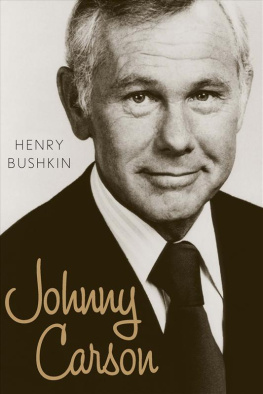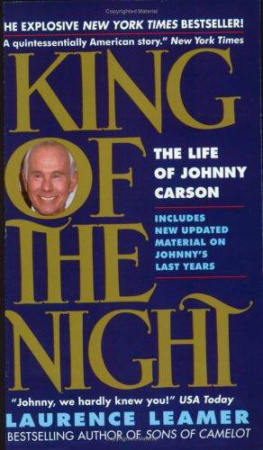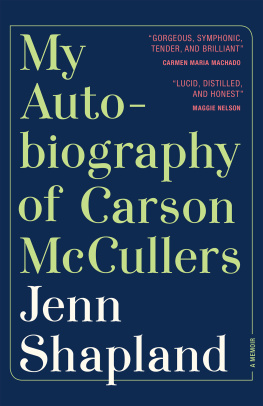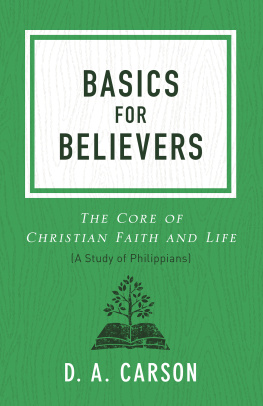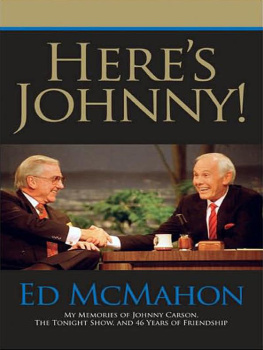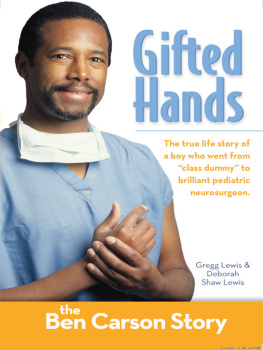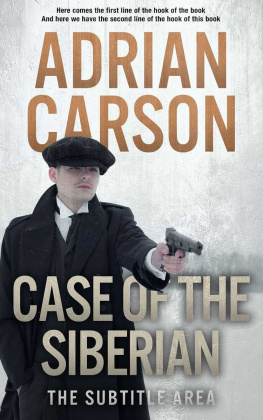Copyright 2013 by Henry Bushkin
All rights reserved
For information about permission to reproduce selections from this book, write to Permissions, Houghton Mifflin Harcourt Publishing Company, 215 Park Avenue South, New York, New York 10003.
www.hmhbooks.com
The Library of Congress has cataloged the print edition as follows:
Bushkin, Henry.
Johnny Carson / Henry Bushkin.
pages cm
Includes index.
ISBN 978-0-544-21762-1
1. Carson, Johnny, 19252005. 2. Television personalitiesUnited StatesBiography. 3. Tonight show (Television program) I. Title.
PN 1992.4. C 28 B 88 2013
791.45092dc23
[B]
2013026951
eISBN 978-0-544-21773-7
v1.1013
1979: The Star Among Stars
Y OU WOULD THINK that by now the questions would have stopped. After all, he went off the air in 1992, and he died in 2005long enough ago for people to have lost their curiosity about Johnny Carson and to latch on to one of the many new stars, superstars, and pseudostars who have risen in the interim. But that really hasnt been the case. Indeed, in the years that hes been gone, Carsons status seems to have been reinforced. Talk-show stars have proliferated, but Johnny is now beyond a star: he is the Undisputed Champion, the Universal Standard. As talented and popular as all his putative successors might be, each of them is still doing a monologue about the days events, still sitting at a desk making jokes with the band, still calling out tonights first guest, still following in Carsons footsteps across a landscape that will be forever his.
People talk to me about Johnny because, sooner or later, it comes out that I worked for him for nearly two decades. I was his attorney, although that term hardly expresses all I did; more properly, I was his lawyer, counselor, partner, employee, business advisor, earpiece, mouthpiece, enforcer, running buddy, tennis pal, drinking and dining companion, and foil. A good portion of my job entailed cleaning up his messesbusiness messes, personal messes, family messes. There are still a fair number of people around Los Angeles who had a business relationship with Carson that ended unhappily; they still love Johnny but hate that prick who was his attorney. Which was just the way Johnny wanted it. By any measure, this was the most complex and stimulating and challenging relationship of my life, the most rewarding and the most disappointing, the one that, a quarter century after its end, continues to provoke, irritate, delight, amuse, and sadden me. He and I were together longer than he was with three of his wives, and he and I were closer than he was with any of his friends, family, or professional colleagues. For all that, nothing shocked me more than the day, six years into our relationship, when I read a magazine article in which he said that I was his best friend. Friend? No, I dont think we were friends. The collar around my neck was usually quite loose and comfortable, but not always. There was never a question about who was in charge.
The question that people most frequently ask me is, What was Johnny really like? They are usually happy to hear the first part of my answer: he was endlessly witty and enormously fun to be around. Their interest flags when I add that he could also be the nastiest son of a bitch on earth. The truth is that he was an incredibly complex man: one moment gracious, funny, and generous; and curt, aloof, and hard-hearted in the next. Never have I met a man possessed of a greater abundance of social giftsintelligence, looks, manners, style, humorand never have I met a man with less aptitude for or interest in maintaining real relationships.
But to understand Johnnys complexity, one must first understand his artistry and the esteem in which he was held. This is not an easy thing to do. If we were to talk about a great movie actor, it would be simpler: his transformation into his character would be evident; the range of behavior he depicts would be obvious; the subtlety and nuance of the human experience that he illustrates would grab you by the throat. But what Johnny seemed to do was more commonplace. He came out and told a few jokes. He then kidded with Ed (McMahon) and Doc (Severinsen), played a game with the audience or performed in a ridiculous skit, and then made chitchat with celebrities. And it was the same thing every night. What was so damn special about that?
Perhaps I had begun to take him for granted, in the way New Yorkers can pass the Empire State Building every day without ever looking up. Then one night early in 1979, I recognized why Johnny was a star like no other. As it happened, I needed to be amidst a galaxy of stars in order to appreciate him.
By the start of 1979, I had been his lawyer for nearly one decade and had been watching him on television for almost two. I obviously knew he was a starNBC paid him like a star, audiences applauded him like a star, and sponsors adored his stellar ratingsbut I guess I had become used to him. Its true, I was more in awe of him when we first met in 1970, but that had a lot to do with the vast difference in our places in the world: I was a young attorney of no particular accomplishment, and he was the well-established host of the dominant program in the late-night time slot. But Johnny seldom played the star around me (whenever he called me, hed begin every conversation by saying, Hey, you got a minute?), and we evolved a productive, low-key business relationship in which he always had the final say, but in which he almost always accepted my recommendations. We also had a personal relationship; we saw each other almost every day and commiserated about personal matters. I was privy to his finances, to the ups and downs of his marriages, to his concerns about his children, to all his interests and his moods, and I traveled with him every few weeks when he went on the road to play nightclubs. Maybe because I saw him at such close range, I lost sight of his immensity. But on that night in 1979a night that fell about halfway through our long association, and one that followed many high points in our relationshipI finally experienced a moment in which I recognized his true stature.
And whats funny is that for most of the evening I was in no mood to appreciate anything good about Johnny.
Where is he, Henry? Ginny Mancini demanded when she greeted me at her door. You told me he would be here by now.
And indeed I had, here being the beautiful Holmby Hills house of Ginny and Henry Mancini. It was an hour after the start time that appeared on the invitation celebrating yet another of the seemingly endless honors and awards Mancini had received during his peerless career (the most prominent of which, his twenty Grammys and threeat that pointOscars displayed on shelves around a large-screen TV built into a wall unit in the den). Several hours before, Johnny had phoned Ginny to confirm that hed be attending and to ask that I be allowed to join him. It was a somewhat odd request, this being a strictly A-list event, but every Hollywood hostess has at one time or another had to accommodate a guest with special needs far odder and potentially more explosive than the presence of his business lawyer.
Frankly, I was surprised Johnny wasnt there already. Hed been famous for his punctuality since his early days in radio (and undoubtedly beforeits impossible to imagine Ruth Carson tolerating tardiness in her son). To say Johnny was late was almost like saying Old Faithful was late; somebody should alert the media.
But late he was, and the clock ticked on. The white-jacketed waiters from Chasens had long ago rolled out the chili and the hobo steak, and soon Ginny would have to call for dessert. Like most of the wives in her set, Ginny treated hostessing as something between an art and a sacred mission, and she approached it with a seriousness of purpose that would have made General Patton look like The Dude from
Next page
